On January 27th the BBC News website published another instalment in its series titled “The Israel Gaza Briefings”.
The latest article is headlined “Huge push for Gaza aid – but little hope for those suffering” and was written by Quentin Sommerville who appears to have accompanied the British Foreign Secretary on a trip to Doha, Qatar, two days earlier.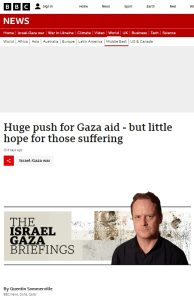
“The Qatar Emiri Air Force cargo plane, a hulking grey C17, sat by a runway at the sprawling Al Udeid airbase. Deep inside, Britain’s Foreign Secretary Lord Cameron, in black loafers and sweater, attempted to push a pallet of humanitarian aid for Gaza into the aircraft. It wouldn’t budge.
He stepped back while burly Qatari airmen in combat fatigues made some adjustments. But the former British prime minister wasn’t giving up, and with a sudden shift, the bundle – part of nearly 30 tonnes of aid including tents and food – began to move into the belly of the plane.”
Towards the end of his article, Sommerville mentions those tents once again:
“The situation inside Gaza is dire – at least 1.7m people have been displaced, some multiple times. The 285 family tents from Qatar and Britain will go to Unicef in Gaza and house up to five people in each tent. In recent days torrential rain there has made conditions even worse.”
Interestingly, a tent which appears to bear the logo ‘Qatar Aid’ turned up on social media a few days later when it was being sold in the Gaza Strip.
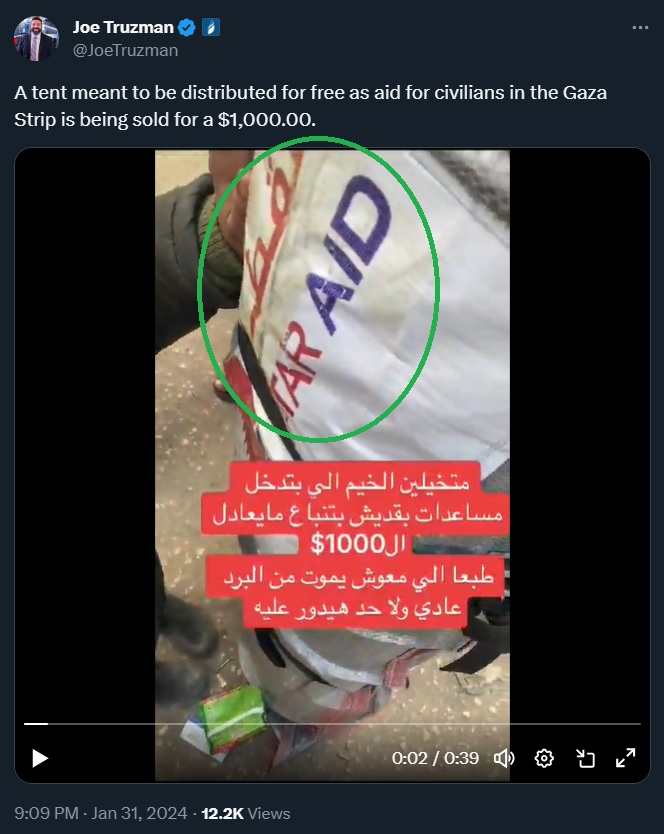
Failing to mention the nationalities of the hostages held by Hamas, Sommerville tells his readers that:
“Qatar and Britain are allies, the Gulf emirate and Israel are not. It hosts the Hamas political leadership, and has been a key mediator in talks to release the hostages still held by the group, which is proscribed as a terrorist organisation by several countries.”
He does not clarify to readers that one of those “several countries” is the UK – which designates Hamas in its entirety, including its “political leadership” – thereby avoiding the question of why the British Foreign Secretary paid a visit to a country which harbours the leaders of a terrorist organisation proscribed by his own government.
The focus of Sommerville’s article is the promotion of talking points concerning aid to the Gaza Strip.
“But there still appears little prospect the suffering will end soon in Gaza. There’s a chasm between the aid Gaza needs, and will need for years to come, and what it is currently receiving.
While Israel’s bombardment of Gaza continues, the flow of aid is being drip-fed into the strip. Britain says 500 trucks a day are needed to provide basic needs – most days fewer than 200 make it inside. On one day this month, only 30 crossed into Gaza.
“It’s vital we can actually get it into Gaza and crucially, once it’s in Gaza, get it around Gaza,” Lord Cameron said.
“What I was saying yesterday to the Israelis, they’ve got to deal with the bottlenecks. They’ve got to make sure the crossing points are opened more often. They’ve got to make sure the checking is done more quickly. They’ve got, crucially, to give the visas to the UN staff and the trucks that the UN staff need to get the aid around Gaza.””
Failing to clarify that bizarre claim concerning trucks, Sommerville also amplifies the same Israel-blaming talking points from Cameron’s Qatari hosts, including in an additional filmed report titled “Israel not meeting international obligation on aid – Qatar” which was published separately on the BBC News website as well as being embedded into his article.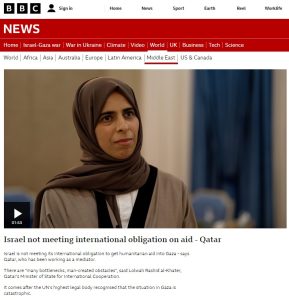
“Hosting Lord Cameron at the airbase was Lolwah Rashid Al-Khater, Qatar’s Minister of State for International Cooperation. Some 12 tonnes of aid on the plane are from Qatar, and even this joint consignment is far from enough said the minister.
“On some days, these past days, even less than 100 [trucks make it into Gaza]. This situation is very difficult. There are many bottlenecks. And as a matter of fact, man-created obstacles, I should say. According to the 4th Geneva Convention article 59, it is the obligation on the occupying power, in this case it would be Israeli occupation, to ensure adequate levels of aid, supplies, and aid schemes,” she told me.”
Sommerville does not question the assertion that Israel – which withdrew all its forces from the Gaza Strip over eighteen years ago – is “the occupying power” in that territory. Neither does he bother to ask his interviewee how, if Israel indeed ‘occupies’ the Gaza Strip – i.e. exercises “effective control” – Hamas was able to construct hundreds of kilometres of underground tunnels, import and manufacture weapons and plan and execute its unprecedented attack on Israeli civilians on October 7th.
Neither does Sommerville clarify to his readers that, contrary to the Qatari minister’s claim, according to Article 59 of the Fourth Geneva Convention, it is not “the obligation on the occupying power” to “ensure adequate levels of aid”, but to agree to and facilitate schemes operated by others. [emphasis added]
“If the whole or part of the population of an occupied territory is inadequately supplied, the Occupying Power shall agree to relief schemes on behalf of the said population, and shall facilitate them by all the means at its disposal.
Such schemes, which may be undertaken either by States or by impartial humanitarian organizations such as the International Committee of the Red Cross, shall consist, in particular, of the provision of consignments of foodstuffs, medical supplies and clothing.
All Contracting Parties shall permit the free passage of these consignments and shall guarantee their protection.
A Power granting free passage to consignments on their way to territory occupied by an adverse Party to the conflict shall, however, have the right to search the consignments, to regulate their passage according to prescribed times and routes, and to be reasonably satisfied through the Protecting Power that these consignments are to be used for the relief of the needy population and are not to be used for the benefit of the Occupying Power.”
However, as in previous BBC reporting on the topic of humanitarian aid, Sommerville refrains from mentioning the obviously relevant topic of Hamas theft of aid consignments. As reported by COGAT in mid-January:
“We witness repeated incidents of Hamas gunmen commandeering aid trucks. Hamas also steals and hoards significant amounts of aid for their needs, placing Hamas guards at collection points for humanitarian aid and using force against residents when they do not comply with the terms of the distribution. In its actions, Hamas is undermining the humanitarian aid being extended to the population.”
Neither does Sommerville bother to inform his readers about the aspects of those “bottlenecks” which are not related to Israel, as explained below by COGAT, which provides daily reports about the amount and type of aid entering the Gaza Strip.
“It is important to emphasize that every day Israel inspects some 300 aid trucks. However, due to logistical failings on the part of the UN agencies, particularly UNRWA, only 120 trucks on average assemble at the border crossings and end up distributing their goods in the Gaza Strip. Each day, hundreds of trucks, having passed Israeli inspection, await entry into the Gaza Strip to unload their cargo. […]
To our knowledge, the aid organizations have a division of responsibilities between them: UNRWA is responsible mainly for the population in shelters; WFP and other NGO’s supply food to those outside the shelters, and the private sector operates parallel to the organizations. […]
Internal disputes over the work methods – The movements of the population and their concentration in specific locations, were supposed to improve the way the food was being distributed in an orderly manner. However, the aid organizations disagree among themselves on how to operate, ending up hindering the distribution to the population (this situation has resulted in the WFP importing food from Jordan without participation from UNRWA, which is preventing other agencies in the Gaza Strip from carrying out their mission and working proactively and on a large scale within the Gaza Strip).”
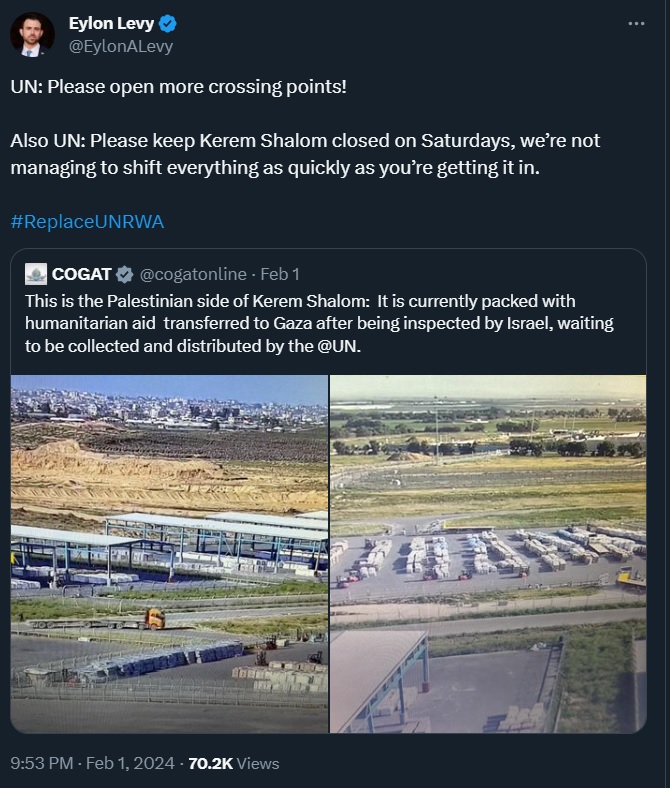
Failing to clarify that “anything…that could benefit Hamas” means dual-use goods rather than humanitarian aid such as food, Sommerville also tells his readers that:
“Nine out of 10 people are living on one meal a day in Gaza, according to the World Food Programme. All aid is subject to stringent inspections by Israel which does not want anything to get inside that could benefit Hamas.”
However COGAT reports that:
“In our meetings with all of the aid organizations, and even the Humanitarian Coordinator, have noted that there is no famine within the Gaza Strip and there certainly is no starvation there either.”
Clearly the point of Quentin Sommerville’s briefing on “Gaza aid” was not to provide BBC audiences with an accurate, impartial and comprehensive portrayal of that topic but solely to amplify the partisan, Israel-blaming narrative promoted by a state which harbours and finances the terrorist organisation that initiated the current conflict and which, sadly, is being echoed by the UK government’s foreign office.
Related Articles:

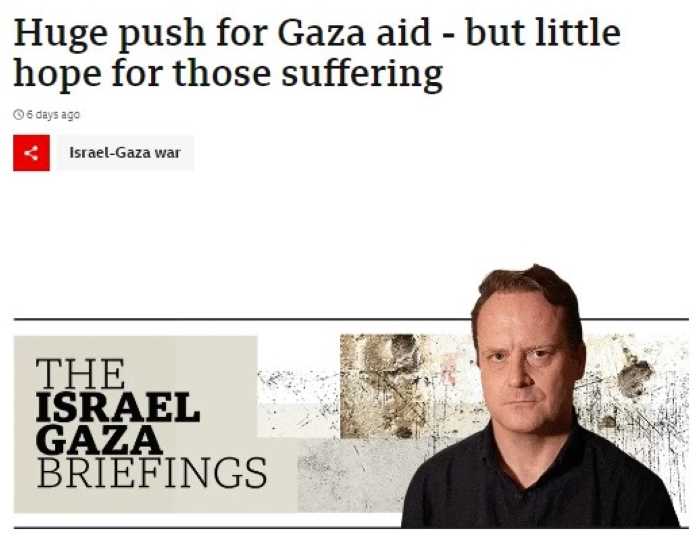
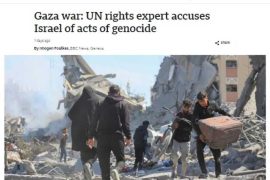
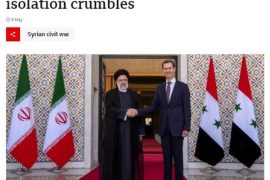


Typical IPC (aka BBC) biased pack of lies – the very reason why nobody (except for antisemitics) ever turns on BBC News.
BBC News, what’s that? did that not disappear before the DODO became extinct?
Lies and more lies, unchallenged BS, Yet they still think they are the best? Well to be sure as per the song ‘The only way is up’ from their current rock bottom ratings
#defundthebbc